Our last blog ended on a cliffhanger of whether we would successfully a) find our way to the China-Kazakhstan border and b) be allowed out of China. Since you are reading this you can hazard a guess as to the outcome. A brief summary of the crossing as follows:
The night train from Urumqi to Khorgos (the border town) arrived at 8.30am.
Found a taxi with a Chinese traveller to the town’s bus station.
Raced into the ticket hall with all the locals when it opened at 9.30am.
Luckily our Chinese taxi friend was able to navigate the bureaucracy to help secure our tickets on the bus. There are only 2 buses daily - once the tickets sell out, tough luck.
The buses leave as soon as they are full, ours left a full hour earlier than expected. Fine by us.
At the border literally 5 minutes later. The Chinese side was very dubious of my passport. “Where are you from?” was asked a minimum of 3 times. My passport is also fraying with fading text only a year after its production - a win for post-Brexit passports.
Finally crossed to the Kazakh side where they waved me through with barely a glance at my face.
Back on the bus for a relaxing ride all the way to Almaty.
Our first land border in Asia ended up being only a medium level of chaotic, which in my book is a resounding success.
Since my only knowledge of Kazakhstan came from its offensive portrayal in the film Borat, my first impression of Almaty was that it was substantially more cosmopolitan than I had expected. As we walked around our neighbourhood on the first day, we were surprised to see more than one branch of the bakery Paul in a shopping mall. Maybe we didn’t need to stock up on face cream in China.
We had only three days in the country as we made the decision to effectively skip it due to its mammoth scale, relative lack of public transport infrastructure, and our lack of time. In that time we went on a very entertaining walking tour where we tried a myriad of cheeses of non-cow origin, i.e. camel and horse. The sour powdery balls are definitely an acquired taste. We also visited Auyl, a “top 50 restaurant in the world” nestled in the moutains around Almaty. I thoroughly enjoyed my horse meat main which has made me question the UK’s adamant aversion to the protein - maybe the French are on to something.
It was time to cross our second land border into Kyrgyzstan. This process was a lot simpler with online tickets and an easy to locate bus station. We flew through immigration at the border and given the proximity to the capital - Bishkek - we got a cab from the border straight to our hotel. Bishkek was more or less what we had expected from Central Asia, slightly rougher around the edges, with strong Soviet influences across its architecture and iconography. Our main source of surprise, however, was the disproportionate number of Indians in the city, and consequently indian restaurants. A quick Google revealed that Kyrgyzstan is a popular destination to study medicine with upwards of 16,000 indian medical students in Bishkek alone. As a result, we treated ourselves to an indian meal on more than one occasion.
A popular mode of transport in the country is the marshrutka, 20-seater minivans which definitely would not pass even the most basic MOT. Though favoured by the average backpacker in Kyrgyzstan, given our long hitlist and relatively healthy budget, we decided to splurge on a rental car for two weeks. Alanna and Ridhima roadtrip 2.0. This time at least, we had a 4x4 and were not dependent on our vehicle for both transport and shelter. Our first stop was Kyzart village, where we booked onto a 3-day horseriding tour to Song-Kul lake. A keen horserider in her youth, Alanna was a natural on her horse. I, on the other hand, was ready to call it quits after the first half hour of ass chafe. A gruelling (for me) five hours later, we trotted into our camp for the evening. The camp consisted of a set of four yurts in the middle of the mountains which looked impossibly remote and inaccessible until we saw the 1980s Mercedes parked close by. After freshening up, we shared a lovely dinner of Kuurdak (a vegetable and beef stew) with the owners before calling it a night at a very resectable 8.30pm. Our yurt was about 20 feet wide and could sleep four. Most of the yurts we stayed in over the rest of our trip had beds, but our first experience was that of thick futon-style mattresses laid on a raised platform covered in traditonal carpets. Very cosy, and made even better by the fact that the owner popped some dried horse dung in the burner making the yurt very toasty.
More horse-riding the next day… it was never ending. I felt particularly sorry for my poor horse who had to lug my fat arse up a mountain at 3,500m elevation. The sweat on his neck, constant huffing, and disgusting farts all clear evidence of his efforts. Beyond the pass, it was a gentle decline to the vast plains surrounding Song-Kul lake. Alanna asked our guide if she could have a canter on the horse. The guide agreed and they both tore off, confusing my poor horse who decided the best course of action was to match their pace. Over the next 20 seconds, I experienced all five stages of grief for my own impending demise. Surprisingly, I opened my eyes, alive, ready to live another day. Alanna giggling next to me, very pleased with herself. To get over this trauma, I enjoyed a very cold (and brief) dip in the lake before dinner. Sadly the cold followed us into the evening where I had to don my trusted pink balaclava to catch a few hours of rest. The last day saw us return to the village down a treacherous mountain path. As we dismounted our horses, Alanna had a tender parting moment with her horse. I ran away.
Over the next couple of days we made our way first to Tash-Rabat, a 15th century inn of sorts used along the silk road. We then drove up to Kochkor, a small town on the way to Issyk-kul lake. Unconstrained by luggage space in our car, after 6 months of minimal living, we made an impulse decision to purchase an authentic Kyrgyz carpet - a Shyrdak. This was a traditional carpet used by nomadic tribes as floor and wall covering characterised by its intricate stitching of felt pieces. Luckily we purchased this before heading to the animal market where we were being offered baby goats for a very reasonable £30. The animal market itself was a real experience. Hundreds of farm animals bleeting, neighing, and mooing as auctioners blared over the speakers with their sales pitches(?). Alanna was on high alert making sure I never walked too closely behind a cow or horse lest I leave with a concussion.
The rest of our drive would be around the perimeter of Issyk-Kul lake, the 8th deepest and 11th largest in the world.
One of our favourite parts of being able to drive are the random places you can drop into en route from A to B. One such place was the Shygaev Modern Art Museum. Tucked away in a small village in the middle of nowhere, was an incredibly well-stocked museum full of contemporary Kyrgyz art. Onwards, we made our way towards Karakol, a popular hiking hub in Kyrgyzstan. To plan our next few days of walking we ventured into the Karakol tourist centre to discuss options. One option was the Ak-Suu lake hike - a 3-day hike at c.3,000m elevation across snow and scree. Alanna was sold. I had my reservations following the gruelling Salkantay trek in Peru. After pulling her to the side and sharing some harrowing pictures and intense reviews of the trek, she relented. We instead chose the more relaxing day hikes in the nearby village of Jyrgalan - the self-proclaimed “Switzerland” of the country.
Our last stop before returning our car was the Aurora sanatorium, an all-inclusive Soviet-era rehabilitation facility where the well-to-do from all over the USSR were sent to relax and get medical care. Upon checking in we were informed that our paltry two-night stay was insufficient to benefit from the treatments on offer. Disappointed but intrigued, we checked in and enjoyed our communal dinner before partaking in a recommended 10-minute stroll in the grounds. The next morning we woke up at 8am to drink some mineral water at exactly 40 degrees celsius, which we drank quickly in big gulps per the guidance provided. This was followed by 9am breakfast of champions - doughnuts and pancakes. Exploring the premises we saw two full floors dedicated to clinics diagnosing various problems - spinal, gastric, baldness(?) - and various therapies e.g. salt rooms, massages, homeopathy. After our snoop we were disappointed to see that the scheduled aquafit class was not running, so we opted for a casual swim instead. By the time dinner rolled around I truly did feel rejuvenated. Perhaps we should have spent the entirety of our two weeks here. Missed opportunity.
The drive back to Bishkek was fairly treacherous. I accidentally skipped two red lights, and narrowly missed being hit side-on by an impatient boy-racer. There were multiple driving test failures on display in those final two hours. But the most important thing is that we returned in one piece. And, as we found out two days later, had no fines or damages to pay to the rental car company - success!
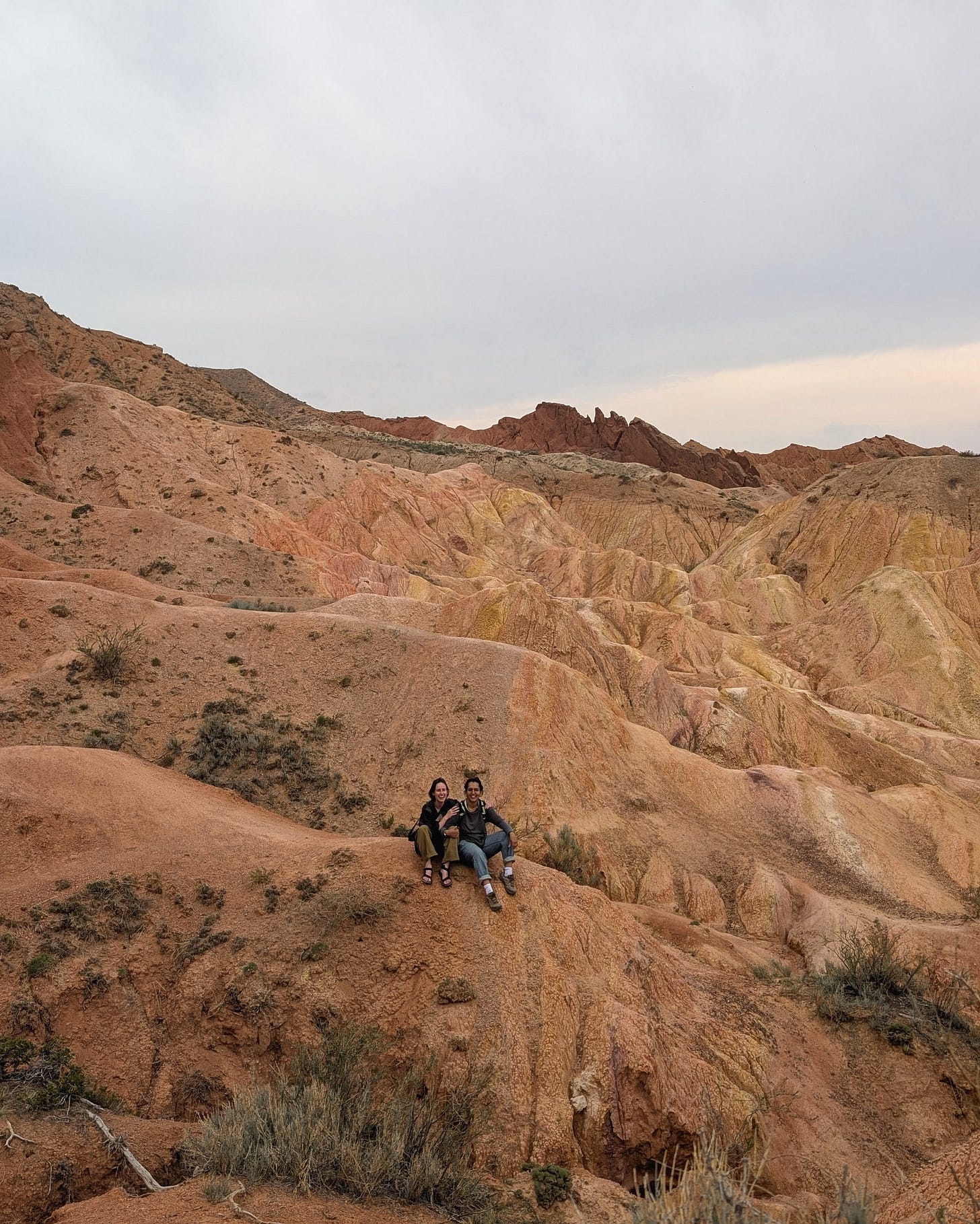
Our Kyrgyzstan itinerary complete, the plan was to grab ourselves a marshrutka the next morning at 6am to the city of Osh in the south-west of the country. From there it was a short bus ride into Uzbekistan and to get to Tashkent by the 7th, via a combination of buses and trains. Sadly, this was not to be our day. Firstly, there were an undetermined number of these minibuses going to Osh on the day, with no clarity as to which bus was going where. Secondly, as soon as one drove into the bus station, people crowded around it and getting a seat on a minibus required intense jostling akin to the Hunger Games. On our third attempt we got on a minibus, which was miraculously going to our intended destination. Beaming smiles and high-fives all around. I settled in for a 13-hour ride and promptly nodded off. I woke up to some tittering about an hour and a half in, and saw we were parked on the hard shoulder in the middle of a valley. After a confusing back and forth on Google Translate with some other passengers we were informed that there was a problem with the engine. This also meant that the minibus side doors and boot did not open, making exit only possible via crawling over the front seat. 4 hours later the driver returned - from Bishkek presumably - and fiddled with the doors for a few minutes, before giving up and disappearing again. 6 hours in, Alanna floated hitchhiking. I was adamant that since no one else had made that move and that perhaps it was wise to follow the crowd. 9 hours in, I did not feel so confident with that decision. The driver returned again, this time with new car battery in-tow. It was clear from the way that he fiddled with random bits of the car, and the way other men were offering their advice that this was a blind leading the blind sort of situation. At this point, Alanna and I, along with all the other patrons, decided to jump ship. Most people decided to continue hitchhiking forwards. I decided it would be best to cut our losses and return to Bishkek. So Alanna put on her best white-damsel-in-distress face and we managed to flag down a car with relative ease. We returned to the earlier bus stop having decided to abandon our plans to Osh entirely and managed to secure overnight bus tickets to Tashkent for the next day instead. Deflated, we retreated to a nice hotel to put our feet up and commisserate this failure of a day.
The next evening we got on to the bus after a relaxing day sipping coffee and reading our books. These were the Ryanair equivalent of buses so comfort was going to be in short supply. After completing the first of two border crossings (Kyrgyzstan → Kazakhstan) we popped some high-grade Melatonin pills (supplied by our good friend at the Tai Chi school) and snoozed into oblivion. By the time we woke up for the crossing into Uzbekistan, we were fresh and ready to face the day. After getting through the border, we ditched the bus and got a cab straight to our hotel where we dropped our bags and immediately fell asleep again. Maybe we weren’t as fresh as we thought.
In Uzbekistan we are due to meet my sister, the first familiar person to meet us along the way. Alanna and I are hoping that our idiosyncracies developed during this trip will not hinder our ability to be normal with other people. The jury is out.
Until next time.

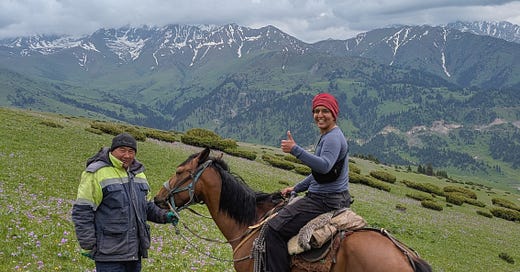



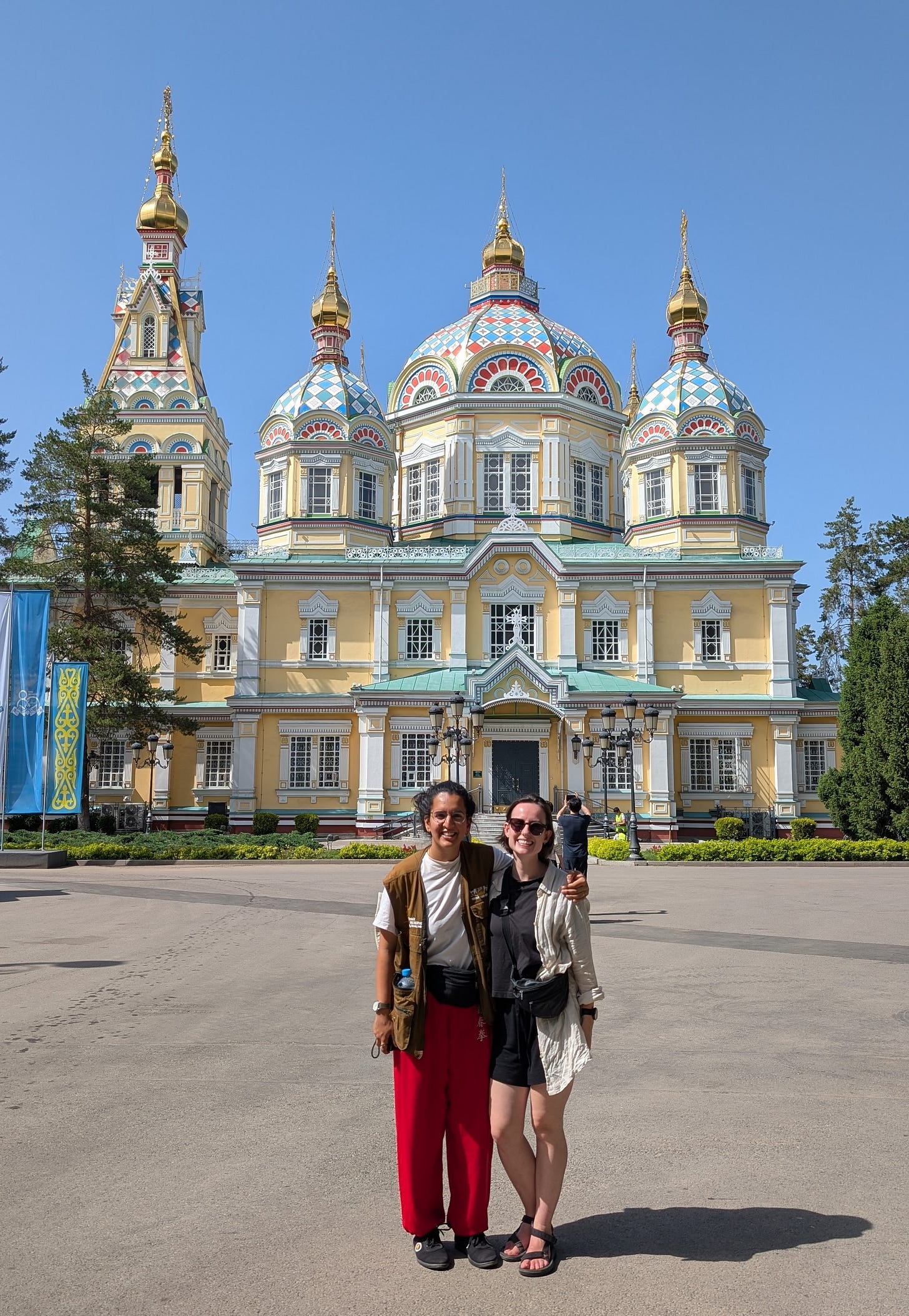
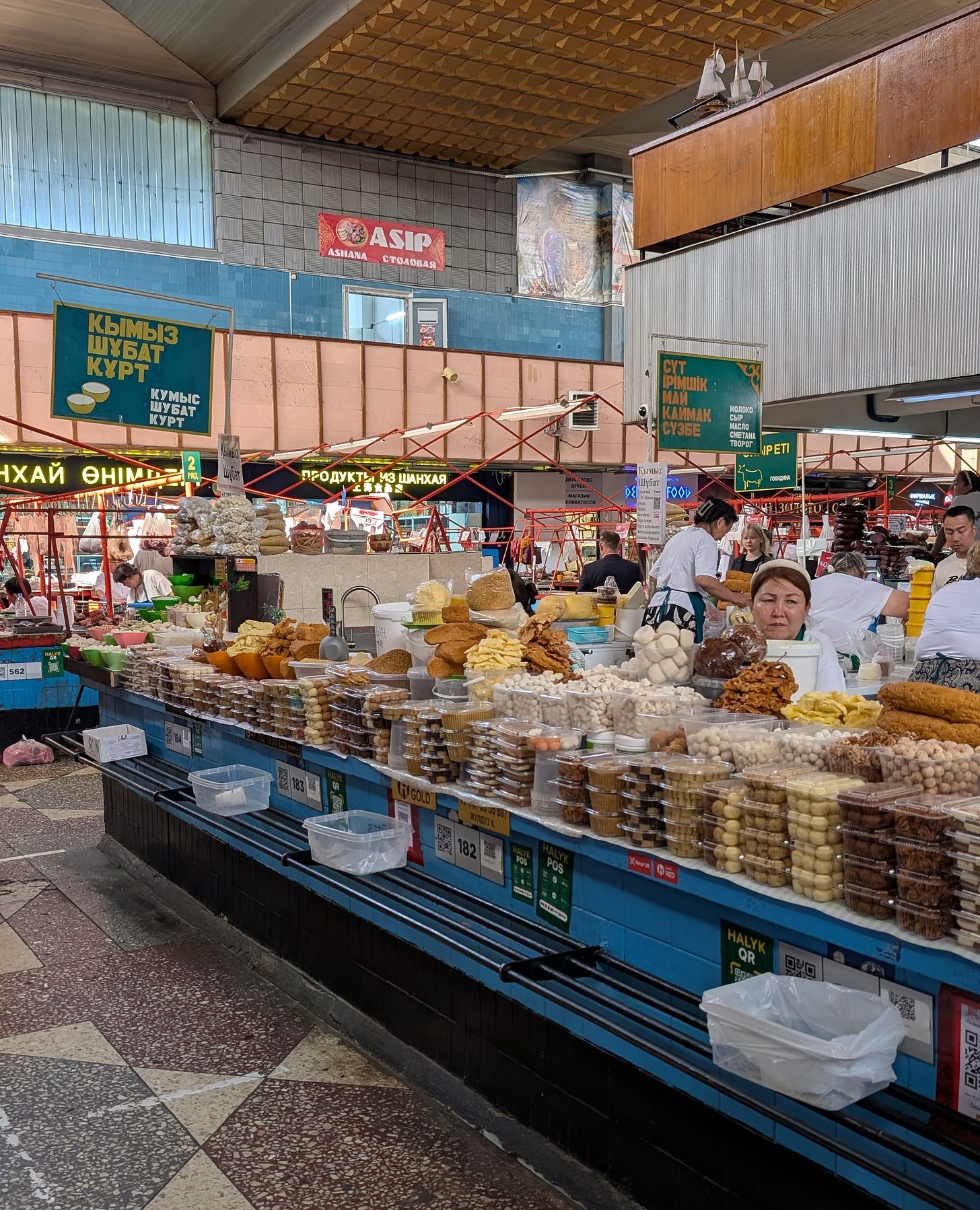
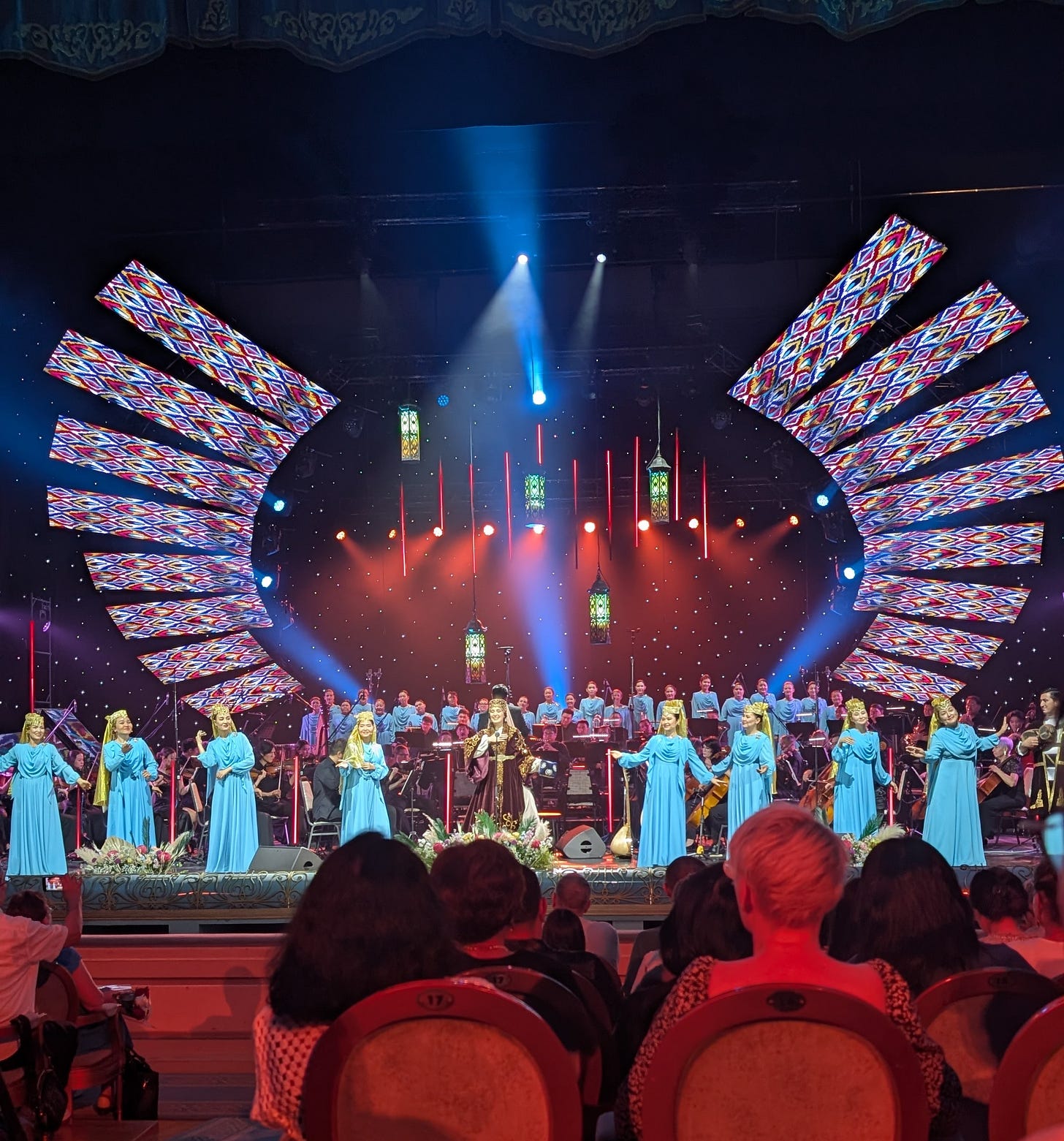
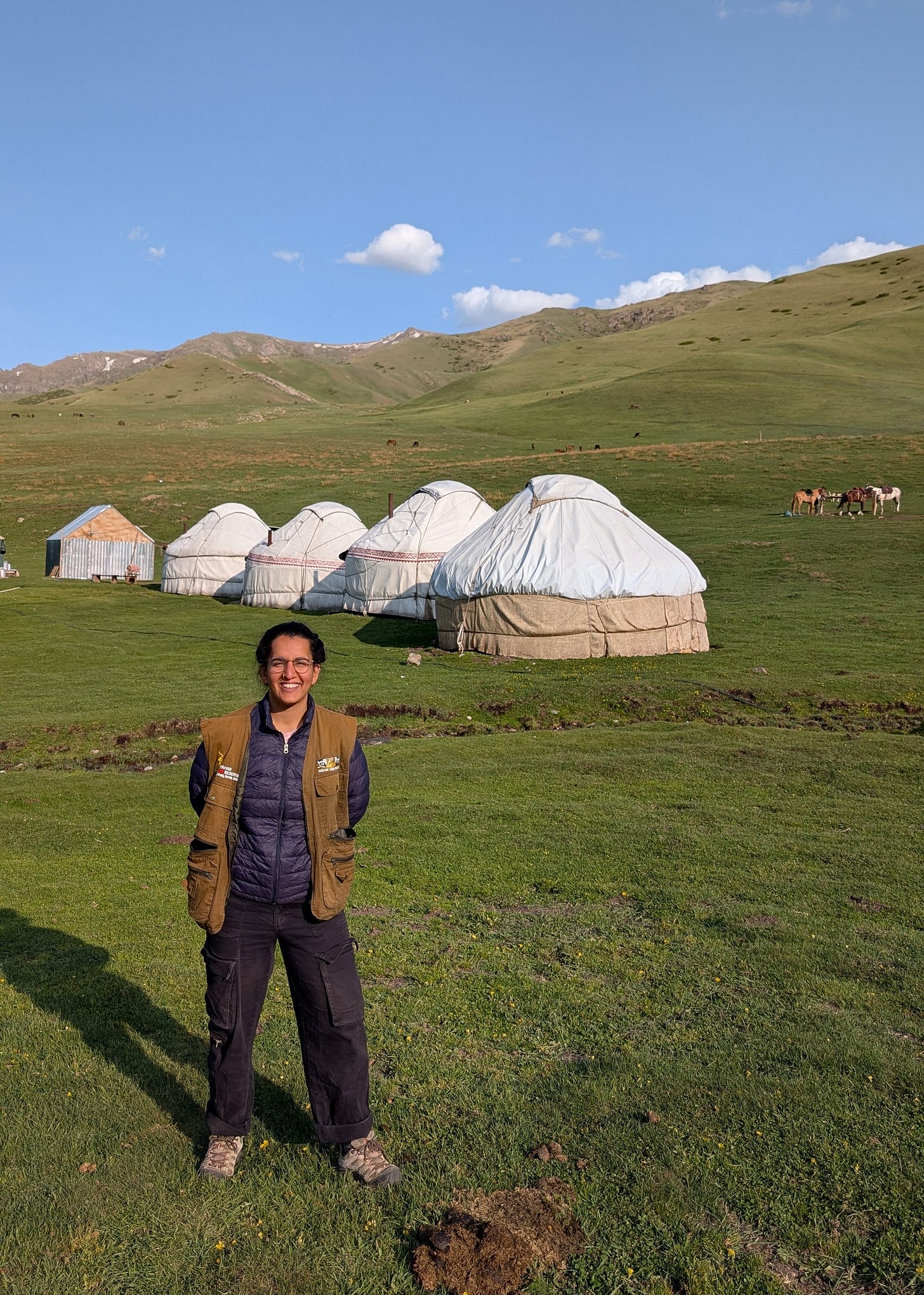
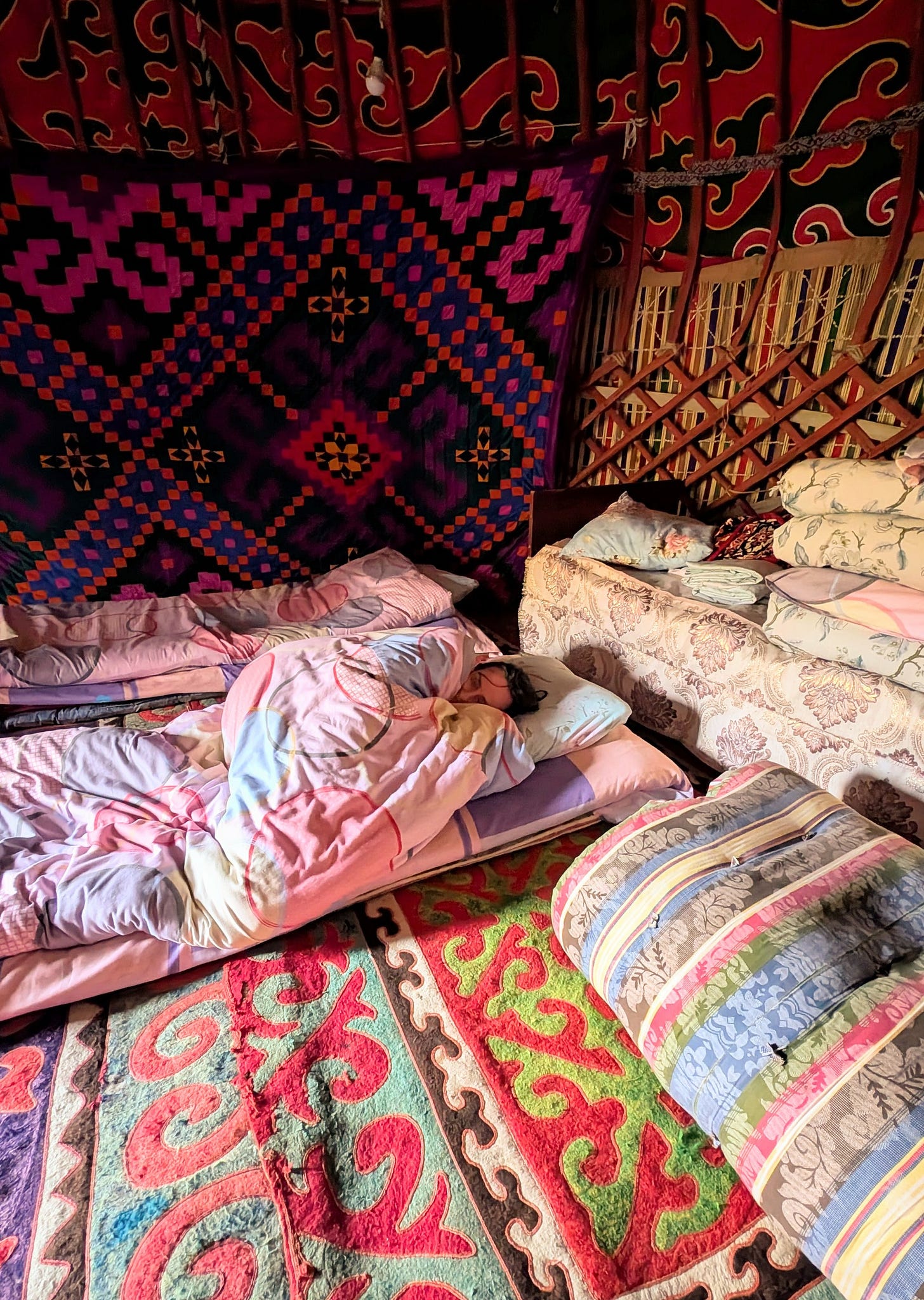
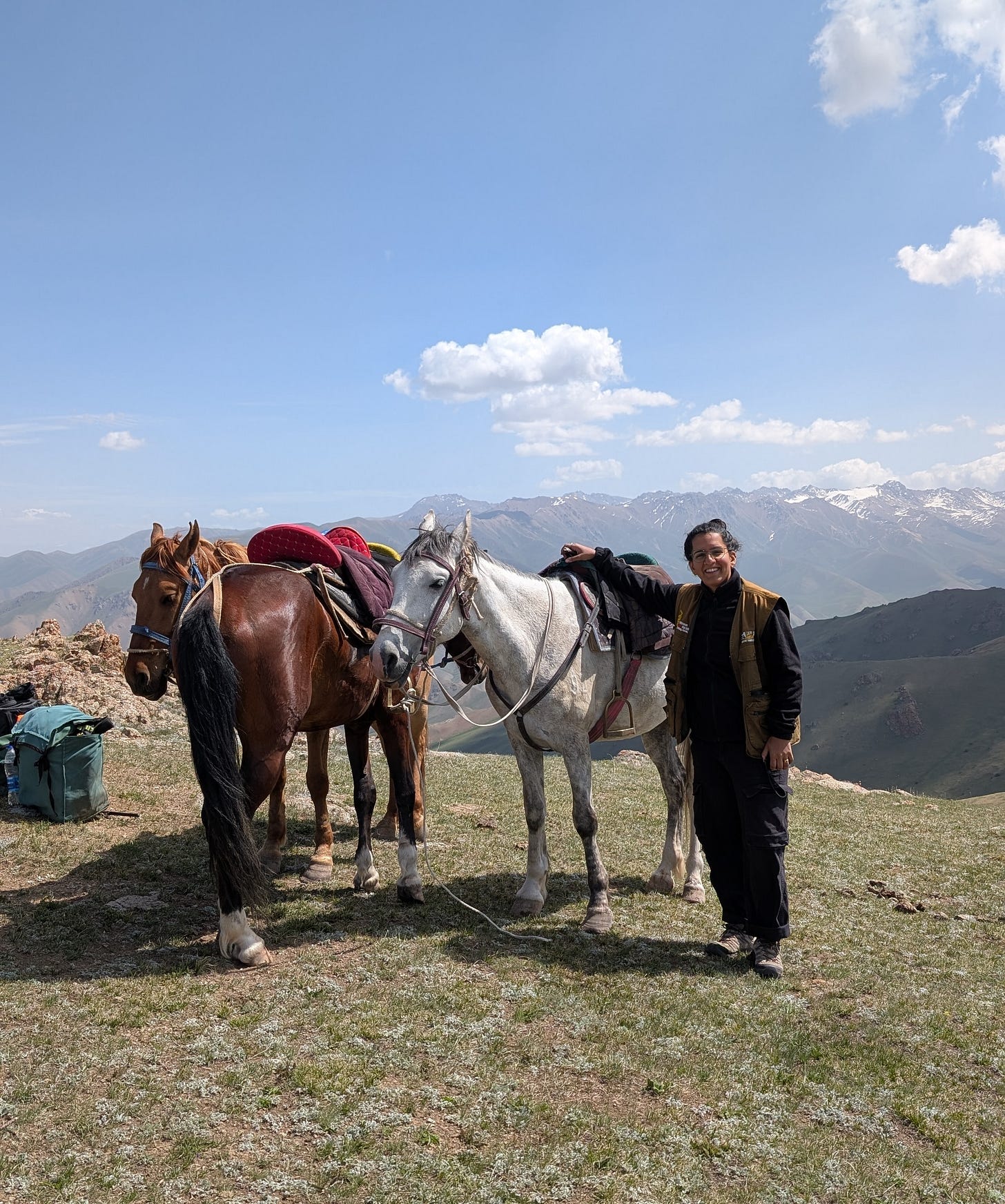
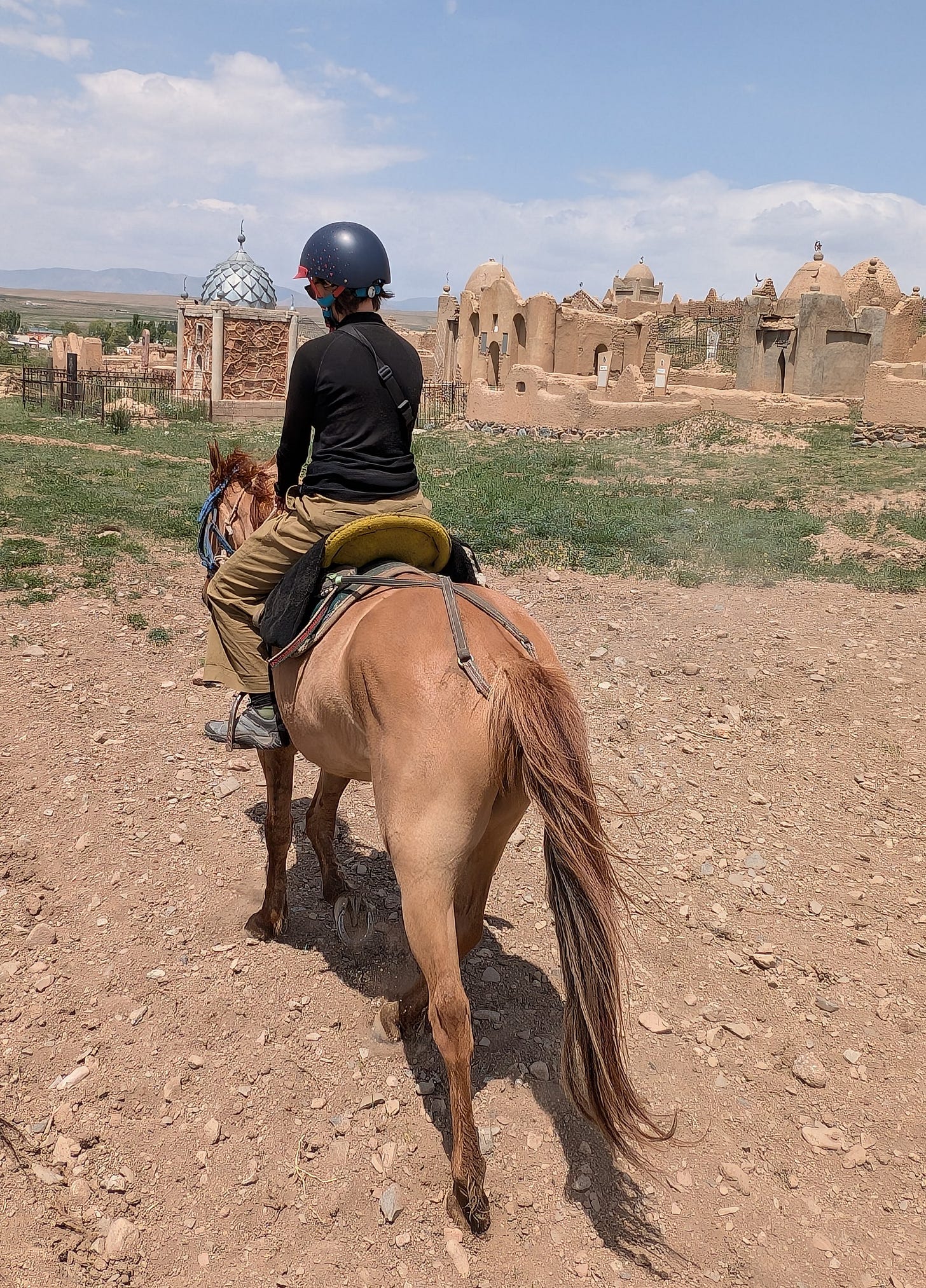
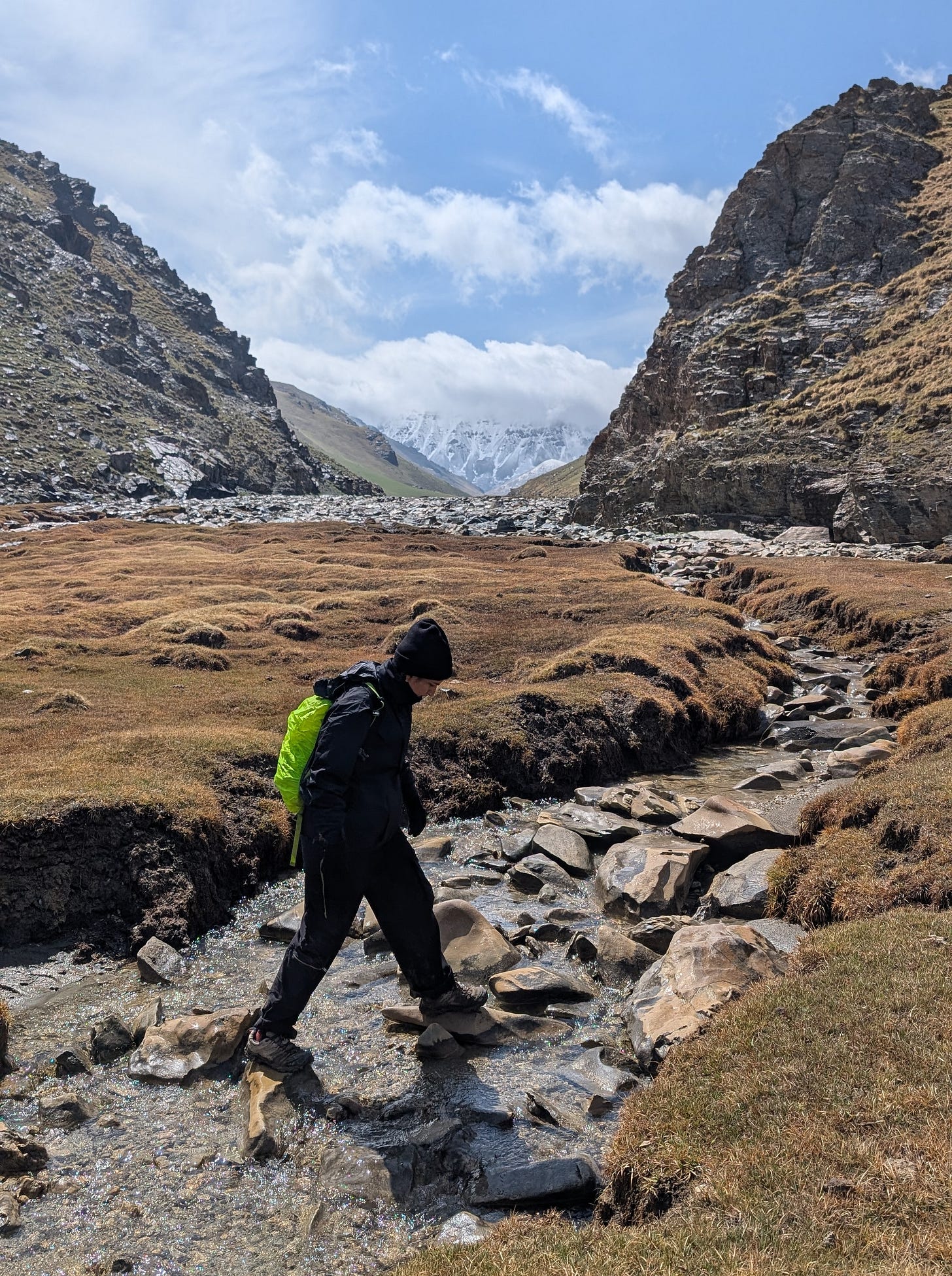
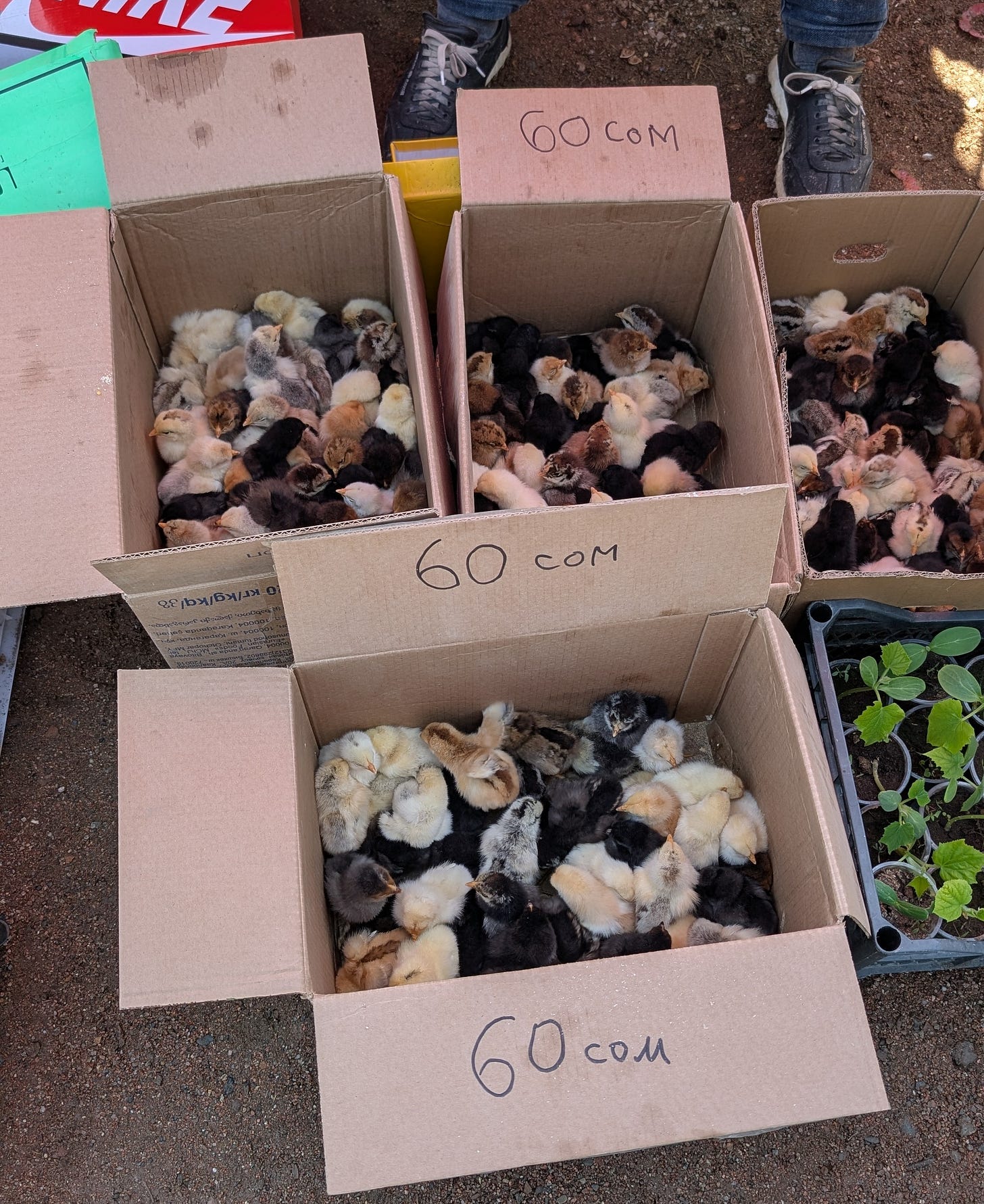
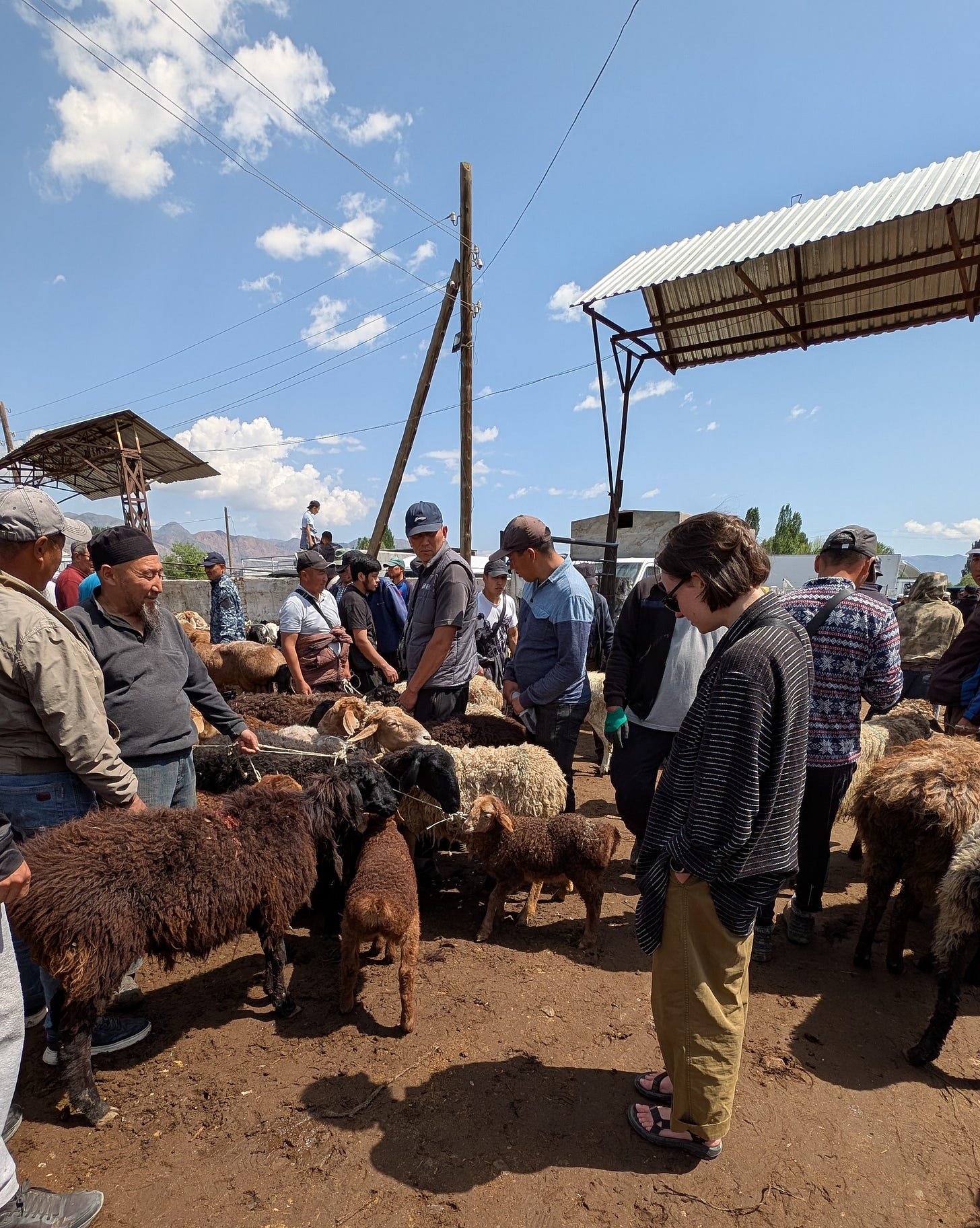
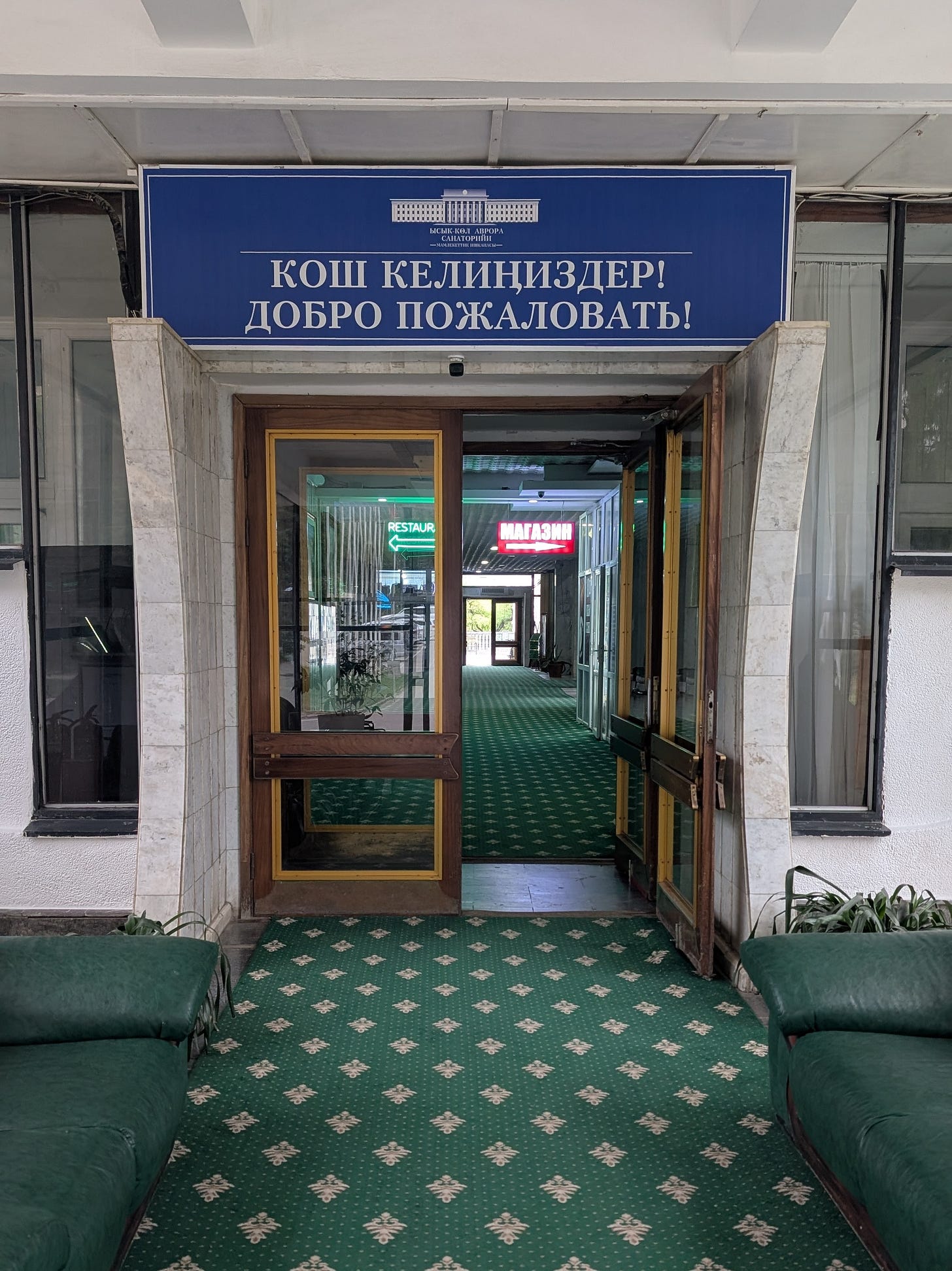
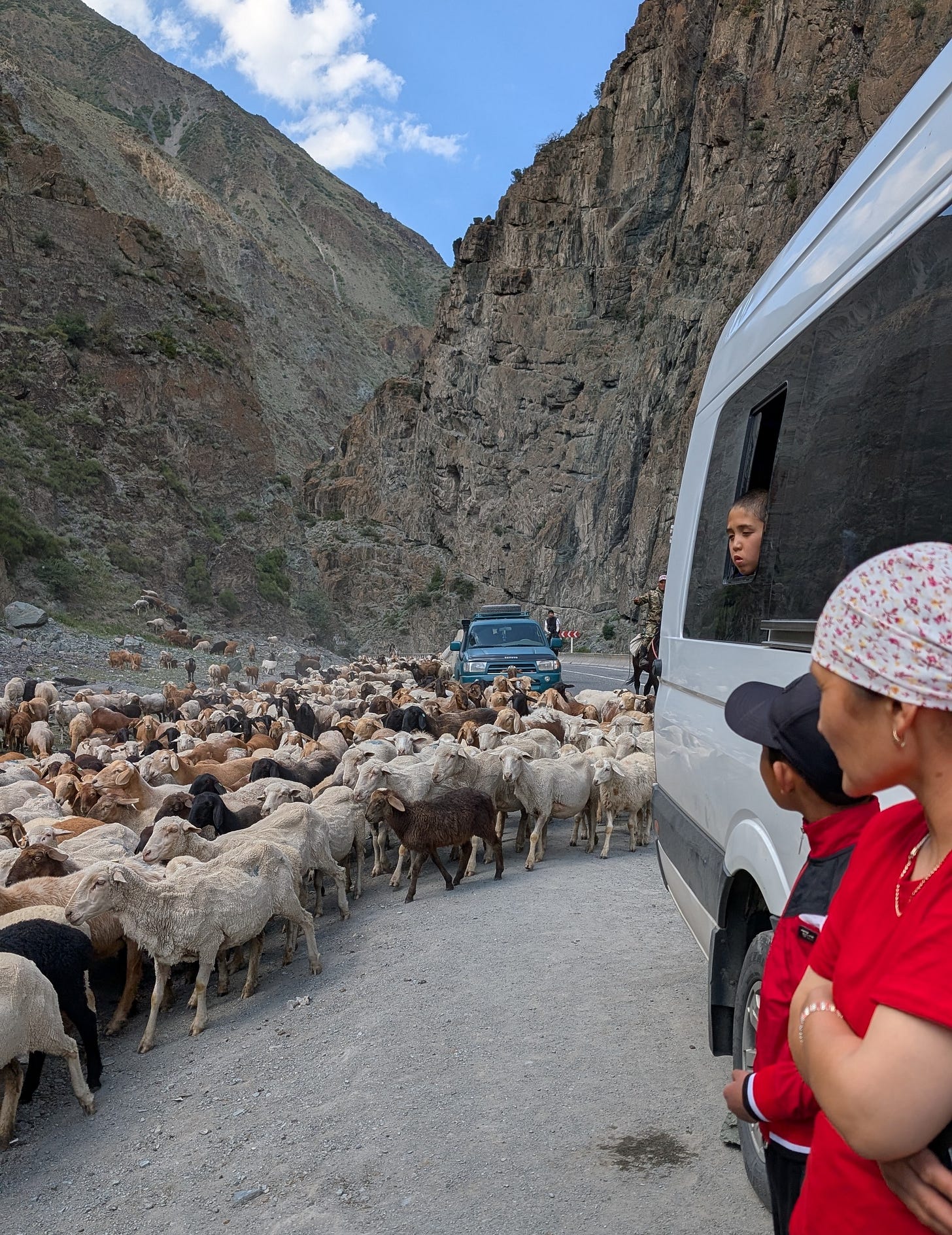
Good luck remembering how to socialise with other people, it's definitely a bit weird and very tiring at first!
Brilliant Ridhima!! Very entertaining read although I don’t fancy having to rely on the local transport system!!